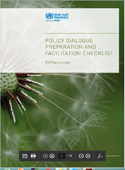EVIPNet Europe - Policy dialogue preparation and facilitation checklist (2016)

Download
WHO launched the Evidence-informed Policy Network (EVIPNet) as a response to the World Health Assembly resolution WHA58.34 in 2005 to build knowledge translation (KT) capacity of Member States. EVIPNet Europe was launched in October 2012 under the umbrella of the European Health Information Initiative, supporting the implementation of the European policy framework Health 2020 and the Action Plan to strengthen the use of evidence, information and research for policy-making in the WHO European Region 2016–2020. EVIPNet has been implementing policy dialogues (PDs) as key KT instruments for evidence-informed policy-making (EIP). These PDs are typically informed by an evidence brief for policy (EBP). EBPs and PDs are examples of tools used to improve the contextualization and utilization of evidence within policy-making.
Evidence briefs for policy (also known as policy briefs) provide direct support to policy-making by packaging the research evidence in a way that it is accessible, relevant, easy to use and applicable at the local level. They start with the priority policy issue (not the research evidence). Thereafter, they use the best available evidence to clarify the problem and its causes, and identify and frame policy options to address the problem. They often feature issues related to governance, financing and delivery, along with important implementation considerations.



